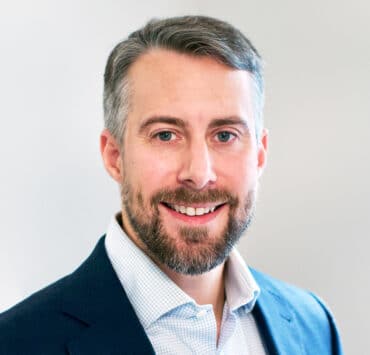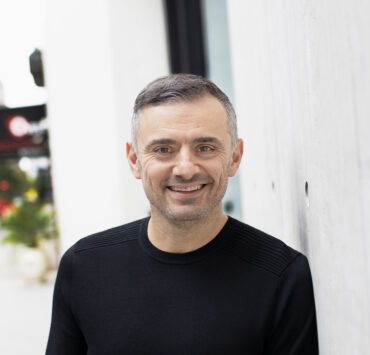|
Getting your Trinity Audio player ready... |
There’s not an entrepreneur on the planet who would decline an hour-long sit-down with Gary Vaynerchuk. Right this very instant, his calls to action and words of advice are undoubtedly being scrawled on whiteboards in start-up spaces worldwide. And for good reason.
The wine critic turned advertising disruptor turned New York Times bestselling author turned patron saint of empathy and kindness currently lords over the most powerful independent advertising agency in media. VaynerMedia was cofounded by “Gary Vee,” as he’s better known, over a decade ago. Since then, he’s not only perfected the art of distilling a powerful message into a couple of sentences, he’s proven that an elevator pitch can often carry just as much weight as a TED Talk.
The forty-five-year-old Vaynerchuk eschews the typical influencer mantras of self-actualization, a mentality popularized by Rhonda Byrne’s 2006 self-help bestseller The Secret. Byrne’s three-step process of positive visualization—ask, believe, receive—doesn’t get a lot of play in Gary Vee’s world.
“If you want to know the secret or what I think of the law of attraction—I think that they only go so far. You can be at home and sit on the couch all day and wish you had two Lambos and a yacht or a $100 million dollar business, but unless you actually put the work in, you’ll never get to the place where that becomes your reality,” Vaynerchuk says in a 2018 DailyVee video titled “The Law of Attraction,” which has probably already been added to the B-school 101 curriculum of more than a few universities.
The entrepreneur’s rejection of the most widely propagated new age success model is precisely why he has attracted such a wide audience. He goes where he thinks he can do something better and does it. He doesn’t imagine success and will it into being—he gets down and dirty thanks to a work ethic that borders on manic.
Read more of Profile’s Top 50 articles.
Vaynerchuk made early investments in Facebook, Twitter, Tumblr, Venmo, and Uber. He cofounded Resy—a restaurant reservation service that challenges OpenTable—and sold it to American Express in 2019. Vaynerchuk returned to the wine world, what he calls a top-ten all-timer for “least welcoming industries,” and flipped it on its head with Empathy Wines, his most recent triumph at the time of speaking in September 2020. Through Empathy, Vaynerchuk began bypassing distributor and retail channels and going directly to wine growers, innovating a direct-to-consumer e-commerce service that he later sold to Constellation Brands.
These are all byproducts of what Gary Vaynerchuk calls an “addiction to the game.” His love isn’t money; it’s an obsession with building a business. Some people love music, some love cooking. Vaynerchuk’s hobby, passion, and life is collectively fueled by the dopamine born out of creating something from nothing. His relentless embrace of empathy and hard work is why he’s a touchstone for anyone seeking a definition for success. It’s why every entrepreneur and media outlet on earth wants an hour with the man.
Profile got exactly nineteen minutes.
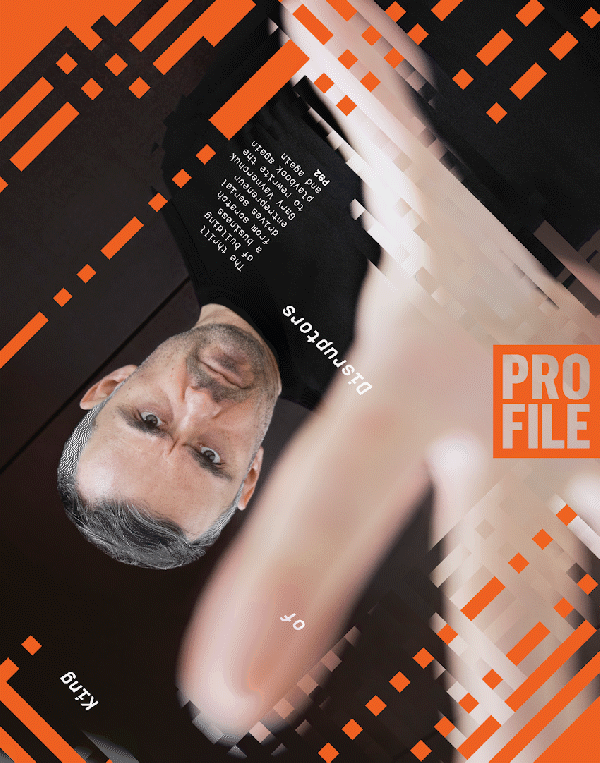
Following an appearance on Good Morning America and the photo shoot for this issue, Gary Vaynerchuk was available for an interview that probably lasted the length of a car ride. At times, the clatter of New York City—and Vaynerchuk’s own fervent way of speaking—made it sound like he was running through traffic to his next meeting. Profile’s goal was simple: find out exactly what makes Vaynerchuk the King of Disruptors and the spoiler of entrenched industries—but also why he’s such a breath of fresh air in stagnant markets.
“I think a lot of it comes down to the feeling of being an immigrant and growing up in a family business,” Vaynerchuk says. “I’ve been honing this craft since I was six years old. Lemonade, baseball cards, you name it. I’ve been this ambitious for as long as I can remember.”
The hallmark of Vaynerchuk’s style, the rabid tenacity and frenetic desire, have been with the disruptor from the very beginning. The immigrant experience coupled with a “no BS” willingness to understand himself cuts any air of pretension. “I’ve really taken the time to try and understand myself and my motivations as objectively as I possibly can,” Vaynerchuk explains. “There was a lot of adversity in my youth. I was a terrible student, because even at that young of an age I understood who I was, and I didn’t fear not succeeding in a system that wasn’t going to bring me any value. That’s what I ask you to do.”
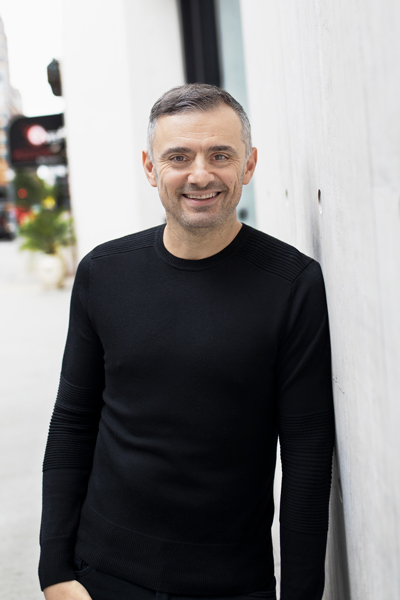
Gary Vee says he’s grateful his parents imbued him with self-awareness, humility, and emotional intelligence. “But because of that adversity, I had huge chips on my shoulders. Fortunately, it made me competitive and ambitious.”
Vaynerchuk is still able to recall clearly one of the most important days of his life. In his official biography on his site, he readily admits that his father “literally dragged him into the family business.” It was there where his intense work ethic made his future clearer. Following his graduation from college, the call was his alone to make.
“My first day of actual work, I was done with school forever. This was the last thing I was doing for my parents to fulfill their expectations for me. I’d spent all these years feeling like a caged animal. But I remember this day in late May. Other than having my children, it was the greatest day of my life. I was so happy and ready to do what I knew I was made for. It wasn’t glamorous; it was working in my dad’s liquor store, but I knew my best was yet to come that day. I just know that is very different from most people’s first day of work ever.”
“Everything I come into, I’m going to disrupt.”
Gary Vaynerchuk
He cuts himself off in the middle of his own story. Because he wants to make one thing clear: you cannot skip the process and go straight to success. “People hear it, but they don’t understand it. It’s so easy to get into better shape physically: go the gym and eat right. It’s astonishingly simple. But people want to use apple cider vinegar and steroids instead. They want to bypass the journey, the process. But when you sign up for entrepreneurship, you’re signing up for all of it,” he emphasizes. “I signed up for the bad stuff. For everything. I’m addicted to the process. You have to be, or you will not survive.”
Maybe more important than inspiring entrepreneurs is letting aspiring entrepreneurs know they’re not cut out for it, Vaynerchuk says. “I’m probably the loudest advocate that you’re probably not an entrepreneur,” the CEO says, frankly. Vaynerchuk muses that if he weren’t a disruptor, he could be the happiest teacher in the world. “Do not ever apologize for what you love to do. If it happens to make money, that’s lovely. I just want to be obsessed with the process. I just happened to be a disruptor.”
***
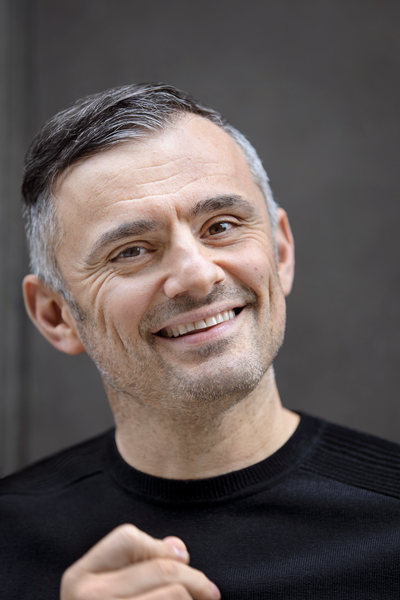
Disruptor. It’s a word that’s already started to lose meaning, but it’s one that Gary Vaynerchuk has personified for forty-four years. “I think a lot of people lack the patience for disruption. People want to be in magazines, and they want to be called disruptors, but they don’t actually love disrupting. They just want money,” Vaynerchuk says. “If we’re talking about disruption, you’re talking about changing a well-entrenched institution that will take decades, not days, to make actually happen.”
When asked how he was able to disrupt advertising, wine, restaurants, and a slew of other industries so quickly, Vaynerchuk says it’s not about him, it’s about passion. “Bro, for the last six months, I sit down at 8:00 a.m. on Google Hangouts and I’m there until 7:30 p.m. Straight. I don’t care where the collateral is from or the accolades or financial impact. This is my addiction.”
It’s not just high-profile success in disruption that has made Gary Vee a household name in business. His Wine Library TV YouTube channel made the stuffy world of wine aficionados accessible to the average consumer. VaynerMedia made such a splash because it was willing to embrace social media as a viable medium to reach consumers when more traditional advertising firms stayed on the fence. A lot of ad firms will now claim to have been on those front lines, but there’s a reason VaynerMedia made such a ruckus. It was already there.
“I think a lot of that comes down to inclusivity,” Vaynerchuk says. “If you look under the hood of my outward energy, I think I’m just inclusive by nature. I’m anti-establishment, I’m anti-closed doors, I’m anti-ivory towers. I think that’s refreshing to some because I help people realize that they can do it too. Even at VaynerMedia and VaynerX, most of the things I believe in marketing people tend to not want to accept. But it’s an absolute reality, and I think it’s helped people get into advertising that felt like they couldn’t.”
“Do not ever apologize for what you love to do. If it happens to make money, that’s lovely. I just want to be obsessed with the process. I just happened to be a disruptor.”
Gary Vaynerchuk
VaynerMedia and VaynerX remain the entrepreneur’s biggest coup precisely because of the industry they were upsetting. “The ad world on Madison Avenue is maybe the least welcome industry in the world,” the CEO says, firing off in succinct, rapid-fire bursts of explanation. There is no animosity in his tenor, but it’s clear that this David versus Goliath undertaking left a fair number of bodies on the battlefield.
Vaynerchuk continues, even more resilient. “Almost any independent agency that’s gone onto any kind of success was started by an executive that already had a lot of juice in the business. VaynerMedia was started ten years ago by a wine guy, and it’s the fastest growing company in the history of the industry. Everything I come into, I’m going
to disrupt.”
***
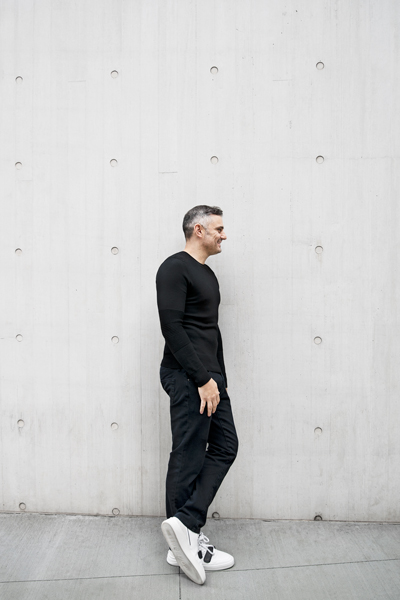
Having spent most of 2020 indoors hasn’t tempered Vaynerchuk’s enthusiasm. If anything, it’s only highlighted his passion for entrepreneurship. “For me personally, the last six months have been really great, because I’m grateful for what I have, not for what I lost during COVID,” Vaynerchuk says. “When you take this life on, that includes the reality that at any moment, everything can change. Entrepreneurship doesn’t care that you opened up your restaurant and COVID happened. This happened. That’s the game.”
It may sound cold, but that’s precisely the point Vaynerchuk is so desperate to convey. For Vaynerchuk, if you’re not as motivated to build during a crisis as you are in an economic upswing, the proposition itself is already a losing one. A disruptor isn’t dissuaded by unfortunate circumstances. They build despite them.
For the rest of us, we need to find our own passions. We need to lean into what we love, regardless of a streak of bad luck, a creative rut, or, in the case of 2020, a worldwide pandemic.
When Gary Vaynerchuk says he’d be just as happy making fifty grand a year doing something he loved, rather than spending twelve hours on Google Hangouts plotting the next big deal, it’s easy to believe him.
That’s the sell. It’s never a question of whether Vaynerchuk would actually sit still at a desk for hours on end grading papers, swearing too much and writing rants in the margins. It’s that when he gets in front of you, he convinces you to believe—that he could be a teacher, an astronaut, a starting NBA point guard.
And because Vaynerchuk’s passion is so pure you find yourself wanting to believe him, wanting to root for him at every turn.
Disruptor In Chief
Gary Vaynerchuk disrupts every industry he enters. A few of his more well-known success stories:
Wine Library (1998): After graduating college and joining his father’s wine business, Gary Vaynerchuk utilized a strong web presence to turn the $3 million business into $60 million in five years.
VaynerMedia (2009): “The Wine Guy” and his brother AJ cofounded an advertising company specializing in social media—with no help from Madison Avenue. It became the fastest growing independent ad firm in history.
Resy (2014): Vaynerchuk elects to take on OpenTable, the standard in online dining reservations, by cofounding Resy. Pre-COVID, the platform handled about 2.6 million dining customers a week and was acquired by American Express in 2019.
Empathy Wines (2019): A return to his roots, Vaynerchuk disrupts again with a direct-to-consumer wine business that almost immediately acquires interest from Constellation Brands and is purchased in July 2020.
Article last updated 4/2/21.

